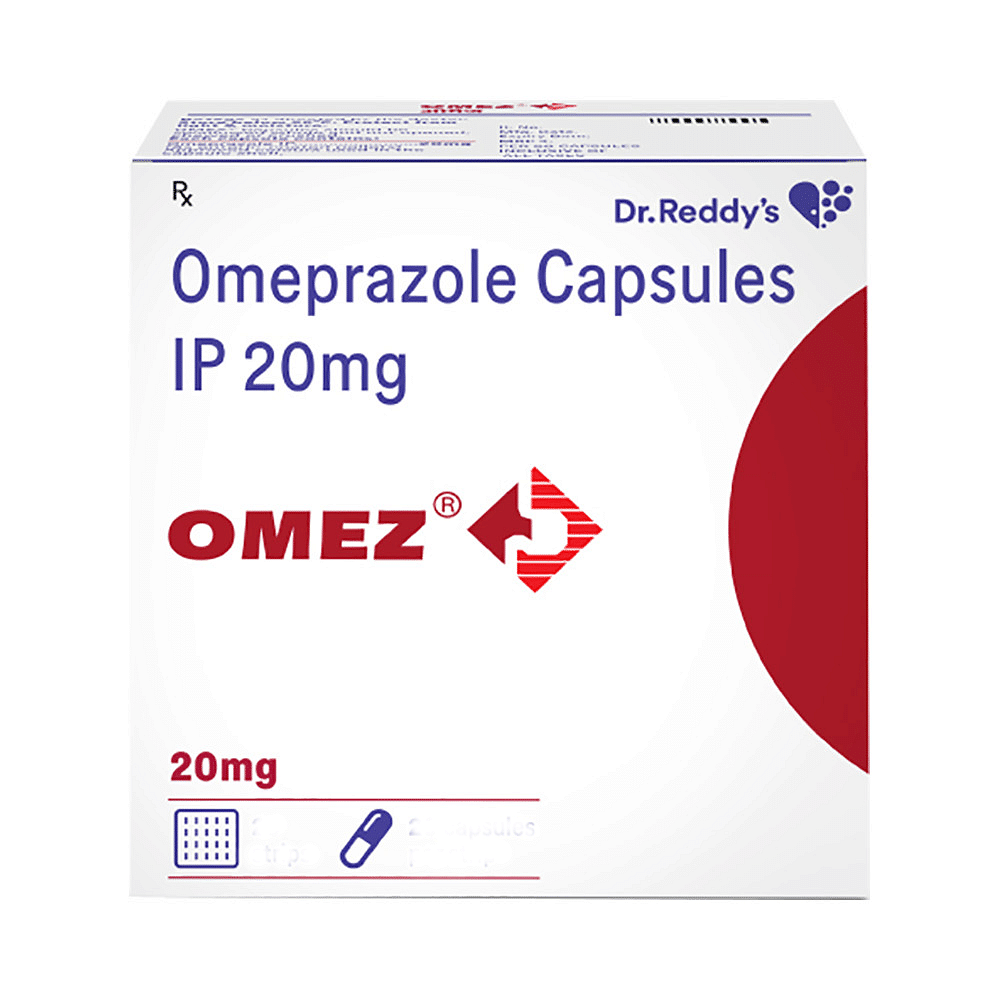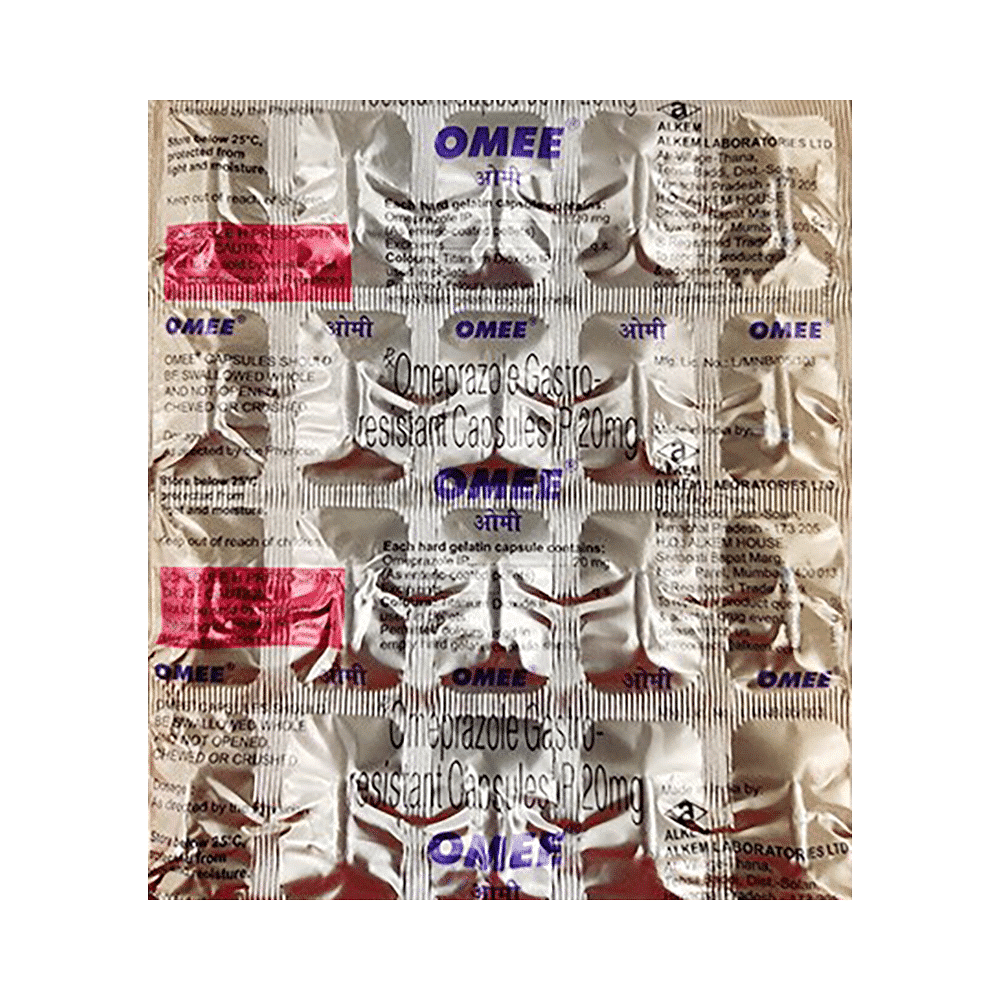
Ojo Cid 20mg Capsule
Manufacturer
JV Healthcare
Salt Composition
Omeprazole (20mg)
Key Information
Short Description
Ojo Cid 20mg Capsule is a medicine that reduces the amount of acid produced in your stomach, used in the treatment of acid-related diseases of the stomach and intestine such as heartburn, acid reflux, peptic ulcer disease, and Zollinger-Ellison syndrome.
Dosage Form
Capsule
Introduction
Ojo Cid 20mg Capsule is best taken one hour before a meal, preferably in the morning. The dose will depend on your underlying condition and how you respond to the medicine. You should keep on taking it as prescribed even if your symptoms disappear quickly. You can increase the efficiency of the treatment by eating smaller meals more often and avoiding caffeinated drinks (like tea and coffee) and spicy or fatty foods.
Directions for Use
Take this medicine in the dose and duration as advised by your doctor. Ojo Cid 20mg Capsule is to be taken empty stomach.
Safety Information
Side Effects
Nausea Vomiting Headache Flatulence Diarrhea Stomach pain
Alcohol Warning
It is unsafe to consume alcohol with Ojo Cid 20mg Capsule.
Breastfeeding Warning
Ojo Cid 20mg Capsule is probably unsafe to use during breastfeeding. Limited human data suggests that the drug may pass into the breastmilk and harm the baby.
Pregnancy Warning
Ojo Cid 20mg Capsule may be unsafe to use during pregnancy. Although there are limited studies in humans, animal studies have shown harmful effects on the developing baby. Your doctor will weigh the benefits and any potential risks before prescribing it to you. Please consult your doctor.
Interacting Medicines
Atazanavir Cilostazol Indinavir Nelfinavir
How it works
Ojo Cid 20mg Capsule is a proton pump inhibitor (PPI). It works by reducing the amount of acid in the stomach which provide relief from symptoms of heartburn, acid reflux, peptic ulcer disease, and Zollinger-Ellison syndrome.
Quick Tips
Avoid excessive intake of carbonated beverages/soft drinks Avoid citrus juices Avoid fried food Avoid caffeinated beverages like tea and coffee Avoid alcohol and smoking Avoid eating late at night or before bedtime Inform your doctor if you get watery diarrhea Inform your doctor if you do not feel better after taking it for 14 days Inform your doctor if you develop decreased urination, edema, lower back pain, nausea, fatigue, and rash or fever
Related Medicines

Ocid 20mg Capsule

Omesec 20 Capsule

Omez Capsule

Omee Capsule

Omesec 20 Capsule

Omez 20 Capsule

Yeom 20mg Capsule

Omodux 20mg Capsule

Omigru 20mg Capsule

Omeled 20mg Capsule
Frequently asked questions
Can I take Ojo Cid 20mg Capsule with domperidone?
This medicine can be safely taken with domperidone as no harmful effects have been reported clinically. A fixed-dose combination of these two medicines is also available. Domperidone works by increasing gut motility, and Ojo Cid 20mg Capsule decreases stomach acid production. Therefore, this combination is very effective in treating reflux esophagitis associated with acidity, heartburn, intestinal ulcers, and stomach ulcers.
What should I know before taking Ojo Cid 20mg Capsule?
Do not take it if you are currently taking a medicine containing atazanavir and nelfinavir (used for HIV infection). Tell your doctor if you experience: persistent diarrhea, vomiting, black stools (blood-stained stools), unusual weight loss, trouble swallowing, stomach pain, or indigestion. Inform your doctor about all other medicines you are taking, as they might interact with Ojo Cid 20mg Capsule. Also, let them know if you have experienced an allergic skin reaction to this medicine. It is not suitable for children under 1 year old or those weighing less than 10 kg. Pregnant and breastfeeding mothers should consult their doctor before taking this medication to avoid potential harm to the baby.
Can Ojo Cid 20mg Capsule cause diarrhea?
Yes, it may cause diarrhea as a side effect in some individuals. This is usually not severe but if you experience persistent watery stools that don't resolve and are accompanied by stomach cramps and fever, seek immediate medical attention.
For how long can Ojo Cid 20mg Capsule be taken?
Take it as prescribed by your doctor. The duration may vary based on your condition; do not discontinue without consulting your doctor.
Can Ojo Cid 20mg Capsule cause calcium deficiency and osteoporosis?
It can lead to osteoporosis (thinning of bones) as it decreases calcium absorption, resulting in a higher risk of bone fractures on prolonged use. This includes fractures in the hips, wrists, or spine. Inform your doctor if you have osteoporosis or take corticosteroids (these may increase the risk of osteoporosis). Consult your doctor for prevention methods. They might recommend calcium or vitamin D supplements to reduce this risk.
What are the long-term side effects of Ojo Cid 20mg Capsule?
Long-term use (more than 3 months) may lead to several side effects, including low magnesium levels in the blood. This can cause fatigue, confusion, dizziness, shakiness, or lightheadedness. Muscle twitches and irregular heartbeat may also occur. Prolonged use (beyond a year) could increase the risk of bone fractures due to calcium deficiency (especially hip, wrist, or spine), stomach infections, and vitamin B12 deficiency. Vitamin B12 deficiency can cause anemia, leading to fatigue, weakness, or pallor. Additionally, you might experience palpitations, shortness of breath, lightheadedness, indigestion, loss of appetite, flatulence, or nerve problems (numbness, tingling, difficulty walking).
Does Ojo Cid 20mg Capsule cause vitamin deficiencies?
It may cause vitamin B12 and vitamin C deficiency. When taken orally, vitamin B12 requires an acidic environment for absorption from the stomach while this medicine causes a decrease in gastric acid secretion. You might need to take vitamin B12 supplements along with it. The clinical significance of the decrease in vitamin C levels is not clear, so vitamin C supplementation is not recommended.
Can Ojo Cid 20mg Capsule be used by cardiac patients?
Patients with cardiac diseases can take this medication as prescribed by their doctor. However, it may interact with certain drugs (e.g., clopidogrel and digoxin), which may be administered to a patient with an underlying cardiac condition. Patients using these medications together need to be monitored closely by a healthcare professional.


